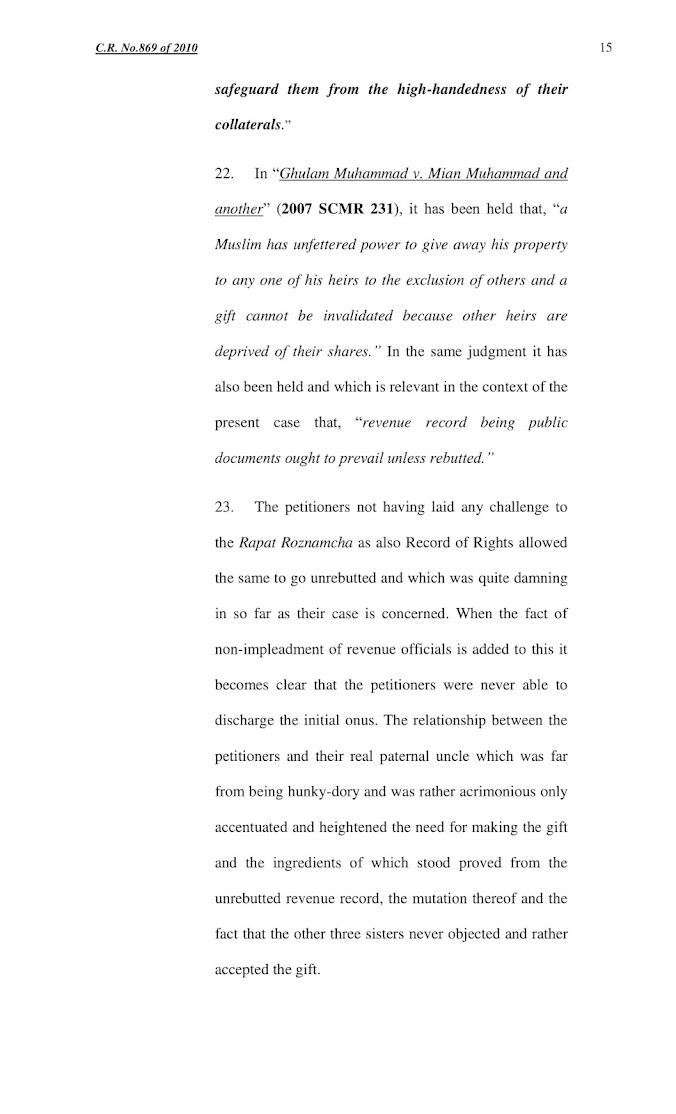Reading of the Rule 11 of Order 32 of the Code of Civil Procedure 1908 (“CPC”) leaves little room to speculate as to what a Court is to do if the guardian ad litem appointed by it does not do his duty. As per the said Rule, where the guardian for the suit does not do his duty, the Court is to remove him and appoint a new guardian in his place. The failure of a guardian ad litem to appear in Court to defend the minor is by itself a clear proof of the fact that he has failed to do his duty of protecting the interests of the minor. The Court, in such circumstance, must act in accordance with Rule 11 of Order 32 of the CPC, remove that guardian, and appoint a new guardian in his place, for the protection of the interests of the minor.
--Limitation and procedure--Civil Procedure Code (V of 1908), S. 115---Civil revision before the High Court re-submitted after Office objection--
2021 S C M R 2100
Muslim men without sons but with daughters to gift their properties to their daughters during their lifetime so as to not allow the sons of theirs brothers or sisters to lay a claim to the property after their death.
It is indeed par for the course for muslim men without sons but with daughters to gift their properties to their daughters during their lifetime so as to not allow the sons of theirs brothers or sisters to lay a claim to the property after their death. It is evident that in the present case the donor had no male issue and going by recognized common tenants prevalent in the society, a sonless father 8 transferring his whole property to his daughters to avoid its transfer to his brothers or their children after his death is not unusual. There is, therefore, nothing alarming either about the approach adopted by the learned appellate court or the basis on which the judgment of the learned appellate court is based. This should be read alongside the fact that there was no love lost between predecessor-in-interest of the respondents i.e. donor and his nephews who had kept him anxiously busy in litigation and against whom the donor had a reason for depriving them of their inheritable share. Therefore, there existed circumstances in which the gift could have been, and was, made.
--Suit for possession ---Suit was filed without seeking declaration qua entitlement in the suit-property--
2021 M L D 2046
Where no executable decree / order has been passed by this Court and no executable decree/order is in existence/holds the field, provisions of Order XLI Rule 5 sub-Rule 2 of the C.P.C ............
Where no executable decree / order has been passed by this Court and no executable decree/order is in existence/holds the field, provisions of Order XLI Rule 5 sub-Rule 2 of the C.P.C could not be invoked to grant stay to the applicants against execution of order passed by this Court in order to avail remedy of appeal before higher forum.
Civil Revision- CM-970-21
NAZIR AHMAD ETC VS ADJ ETC.
Mr. Justice Muzamil Akhtar Shabir
18-02-2021
2021 LHC 6894
-Marked yet subtle distinction existed between a suit for cancellation of a document under S. 39 of the Specific Relief Act, 1877 ('Act of 1877'), and a suit for declaration of a document under S. 42 of the Act of 1877-
2021 S C M R 1986
Petitioner filed suit for declaration alongwith permanent injunction..........
Petitioner filed suit for declaration alongwith permanent injunction. During pendency of the suit, they instituted another suit for the same relief, whereafter withdrew the earlier suit. As such the subsequent suit is not barred by law.
Civil Revision 1786-12
SARDARAN BIBI ETC VS REHMA ETC
Mr. Justice Ch. Muhammad Iqbal
11-11-2021
2021 LHC 6784
It is well settled law that the Application under Section 12(2), C.P.C., if alleges fraud and misrepresentation with particulars, needs framing of issues and recording of evidence.
It is true that for determination of such fraud and misrepresentation not only the framing of issues was essential but recording of evidence was also obligatory in order to provide the opportunity to the parties to prove the factual dispute elaborately inserted in the application under Section 12(2), C.P.C. as envisaged under Article 10-A of the Constitution of Islamic Republic of Pakistan, 1973, which stipulates that while deciding the matter fair trial and due process shall be granted to the litigant.


















































